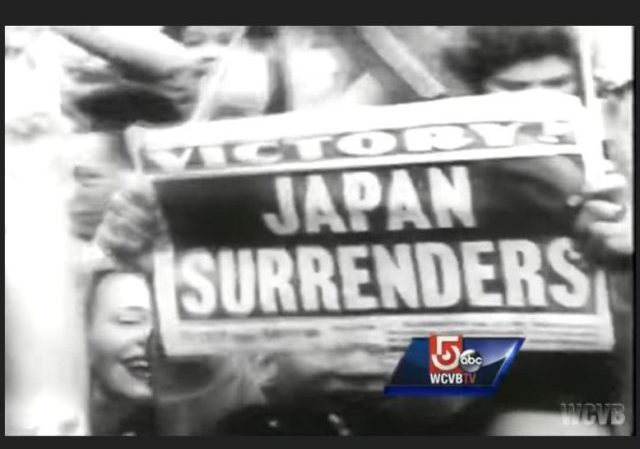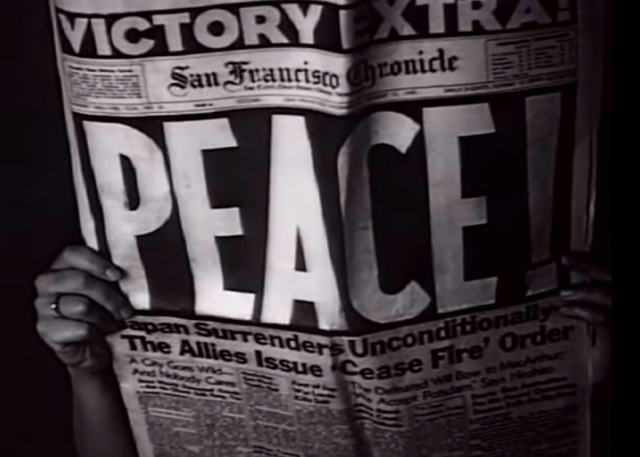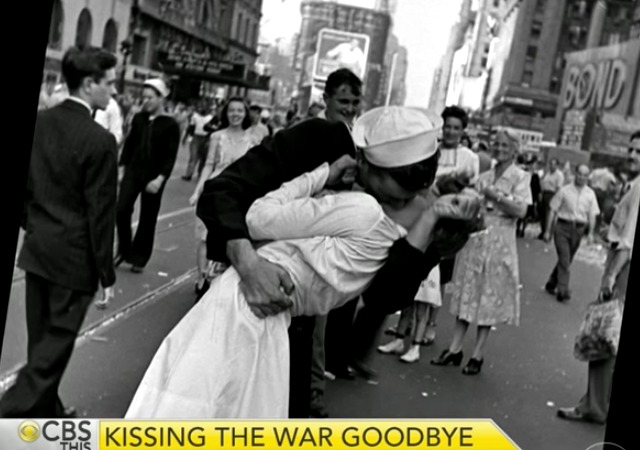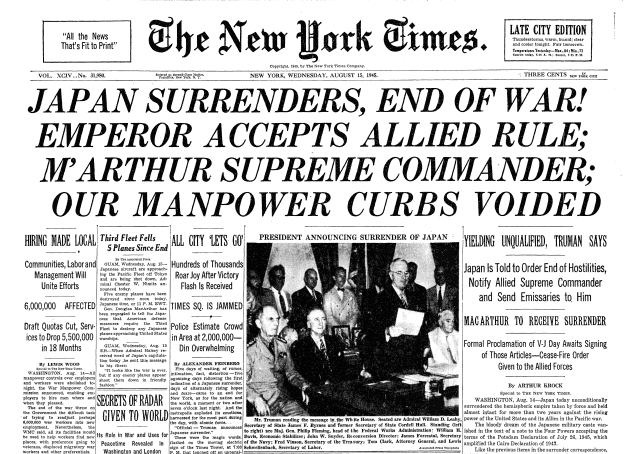Victory Over Japan Day
The holiday is still celebrated only in Rhode Island, as we remember the over 160,000 Americans killed in the Pacific theater.

It’s a little quiet here in the State of Rhode Island and Providence Plantations.
Because today is Victory Day, formerly known as VJ Day, formerly known as Victory Over Japan Day. The progression of names to the generic Victory Day was to accomodate the hurt feelings of, umm, who exactly? The Japanese over whom we were victorious and who started it but couldn’t finish it? Historically the day is to mark Victory Over Japan, but history is a casualty of the war waged by political correctness and hurt feelings.
So Victory Day it is. Rhode Island is the only state that still celebrates the victory. Wait, how can we even use the term “victory”? Isn’t that some sort of microaggression, don’t all participants in war get a trophy?
I have covered Victory Day almost every year, scroll through the Victory Day tag for prior posts and some history.
Every year, local Rhode Island media covers the holiday. Here’s an excerpt from WPRI’s extensive article on the history of the holiday:
Like Del’s Lemonade or Saugy dogs, Victory Day is a unique summertime tradition in the Ocean State.
Monday is Rhode Island’s 71st annual Victory Day, continuing the state’s custom of being the only one that observes a legal holiday to mark the end of World War II. While the actual event it commemorates happened on Aug. 14, when Japan’s surrender was announced here, the holiday is now observed on the second Monday in August.
And no, despite what many residents believe, the legal name of Rhode Island’s holiday was never “V-J Day” (short for “Victory Over Japan”). It has always been called “Victory Day” on the statute books, going back to its establishment in 1948.
Rhode Island has apparently been on its own since the late 1960s or ’70s, when Arkansas dropped its version of Victory Day — known there as “World War II Memorial Day” — and reportedly gave state workers their birthdays off as a consolation. (While some websites claim Victory Day used to be a federal holiday, too, that appears to be a myth – there is no evidence for it in an authoritative 1999 U.S. Senate report on the topic.)
As far back as the 1950s, The New York Times wrote that Victory Day – which the paper, like many news outlets then and now, referred to as “V-J Day” – was “always a big legal holiday in Rhode Island.” In the “Encyclopedia of American Holidays and National Days,” author Len Travers remarks, “The tenacity of Rhode Island in celebrating Aug. 14 deserves special attention for its interplay of state, local, national, and even international politics.”
1 in 10 Rhode Islanders went to war
Rhode Island established Victory Day in March 1948, almost three years after the end of World War II, when the General Assembly passed a bill sponsored by Rep. Richard Windsor, a long-serving East Providence Republican, to designate Aug. 14 as a state holiday. (The legislature changed the law in the late 1960s to set the holiday as the second Monday in August.) The American Legion had been pushing the idea since as early as 1946.
The Providence Journal documents how even in Rhode Island, the holiday has faded:
Once, this state and others observed “Victory over Japan Day” and “V-J Day,” as it was called, with spirited ceremony. The original celebrations, in late summer 1945, brought dancing in the streets. Times Square overflowed with the joyous. President Harry S. Truman proclaimed a national observance.
But time passed. Tenor tempered: Japan had surrendered after the only two atomic bombs ever used against humans were dropped on civilian residents of Hiroshima and Nagasaki. In 2019, only Rhode Island keeps Victory Day on its calendar.
If any official observances were planned for Monday, they were not widely publicized. But not far from Veterans Memorial Cemetery, beach traffic was thick and stores were busy. Three-quarters of a century is a long time.
Still, some remember.
“As long as there are veterans alive who fought in the brutal Pacific war, Victory Day must continue to be observed,” Tim Gray, documentary filmmaker and founder of The World War II Foundation, told The Journal.
“We owe it to the men who fought, survived and in many cases, died on islands nobody had ever heard of then and unfortunately have been largely forgotten today. It’s a way to remember who they were and what they did for all of us.”
Said Kasim Yarn, director of the Rhode Island Office of Veterans Affairs: “To the ‘Greatest Generation’ that shaped the world, thank you!”

Every year I post this video of the original Victory Over Japan Day in Honolulu, August 14, 1945, as we remember the over 160,000 Americans killed in the Pacific theater.
VJ Day, Honolulu Hawaii, August 14, 1945 from Richard Sullivan on Vimeo.
That original VJ Day gave us the iconic image of a sailor kissing nurse in Times Square.

Both the nurse and the sailor have passed away. And so have our memories.
There’s only one place where Victory Over Japan Day has not faded — at Legal Insurrection. As long as we have the strength to push down on the keyboard with our bloodied, swollen fingers, we will recall this day of victory.
 DONATE
DONATE
Donations tax deductible
to the full extent allowed by law.









Comments
Fun Fact: The phrase “Kokura Luck” is a Japanese phrase derived from the fact the bomber bringing the payload for the second bomb circled a couple of times over that city…but could not drop it due to cloud cover. Nagasaki was hit instead.
https://www.citylab.com/life/2019/08/atomic-bomb-anniversary-hiroshima-nagasaki-kokura-japan/595825/
Wow! I never knew that. Thanks, Leslie!
One of the most important decisions in world history was made when the allies chose to demand unconditional surrender, the decision to destroy the warlike culture that permeated throughout the japanese and nazi population. While considerably more lives were lost in the short term, the overall effect was that far fewer lives were lost in the long term. The world has two very productive economies that are strong allies. (at least until merkel).
The use of Fat man and little boy, contributed to saving 2-3 million of American, Chinese and Japanese lives. (vs the 200k-400k japanese lives)
Yup, I’m an A-bomb survivor. My father was on his way to the invasion of Japan when they surrendered.
My Dad also. He finished up in occupied Japan.
Japan’s conduct in the war, their abuse of POW’s, they deserved the A bombs, and they are very lucky that we stopped after only two were dropped.
On the contrary, we’re lucky that they surrendered after two, because we only had two.
We had more bombs in the pipeline, but it would have been a delay.
True, but think of the terror resumption of cities being destroyed would caused. I can’t remember the specific document, but I read somewhere that they would have been able to produce one or two nukes per month. Enrichment was in full production.
The bomb gave Hirohito a face saving way to surrender. It clearly saved both American and Japanese lives.
It did more than that. Japanese emperors were supposed to reign, not rule. Policy was in the hands of the government, and the government wanted to call our bluff and fight on. Hirohito took advantage of the chaos to seize control of the radio station and broadcast his surrender.
My father spend a year and a half in the Pacific, the last two months in Japan in the early days of disarming and occupying them.
Never would buy a Japanese car and had signs of the various diseases he picked up for life.
He always remembered VJ Day too.
Like many here I’m sure, I knew a lot of WW2 vets growing up. They were my cousins, uncles, father.
I would say that, to a man, none of those who served in the European theater had any lingering animosity towards the Germans.
Not so with the Pacific theater vets. Every single one of them still hated the Japanese with a passion decades after the war ended.
I remember when the Japanese emperor (IIRC) visited the UK about 15-20 years ago. During a motorcade, he was greeted by the backs of British survivors of the POW camps.
I was in the USN for 25 years. My uncle also served in the Navy during the war. When I told him that I was stationed in Japan, I thought he was going to have a stroke in front of me. He was livid. He DESPISED the Japanese 40 years after the end of the war.
Back when the New York Times had eight densely formatted columns of text, and still mostly told readers what had happened (instead of how to think).
Nonetheless, your chances of survival as an American prisoner of war were far greater had you had been captured by Nazi Germany than if you’d been captured by Imperial Japan.
For one thing, the Germans didn’t eat their prisoners.
japanese soldiers also ate each other.
My father, from RI, served in the 43rd Infantry Division in the Pacific. He was a National Guardsman in the hurricane of 1938 hurricane and when war broke out was sent to Florida for training. He left home and did not return home until 1945 until he was shot in the Phillipines. A charter member of the Greatest Generation. He served with honor, never complained and even considered volunteering for Korea and Vietnam because he did not like how those wars were being waged.
C’mon guys. August 15th, 1945 was the day of the Emperor’s broadcast. Today’s only the 12th.
August 6th and 9th, 1945 were the days of the Hiroshima and Nagasaki bombings, September 2d, 1945 was the day the Japanese signed the Articles of Surrender on the deck of the Missouri.
Dont feel bad though, Discovery Networks, in one of their documentaries, announced that September 2d was the day the Japanese announced their surrender.
I LOVE that film in Honolulu! So fresh!
And none of them are cowed into being afraid to be happy for America!
Sooo refreshing!
Makes me wanna go home. To 1985.
Imperial Japan was an abomination on humanity akin to Nazi Germany and Stalin’s genocide in Russia and Mao’s genocide in China.
Alas, history has been re-written for a generation of Americans and Europeans.
History repeats itself upon the ignorant – witness the fascists allowed to infest our government, schools and our media and so lauded by our young.
August 6th is American Technology Day.
Del’s Lemonade, NY Systems Wieners, (Eclipse) Coffee Syrup, and Clamcakes and Chowder at the Rocky Point Shore Dinner Hall.
My father served in England, North Africa, and Italy. In the summer of 1945 he was posted to the Pentagon, expecting to be sent to the Pacific. It’s very possible that I owe my existence to the bombs and the Japanese surrender.
I repeat this claim not knowing if I have made it here before. As a pre-teen one of our neighborhood games was two teams one to go hide and the other to go and find them. During one of my hides. I went into an old guy’s detached garage to wait out the time limit. While I was there I opened an old steamer trunk I was sitting on and looked inside. Lots of WWII stuff, belts, helmet, webbing etc and a blue book. I picked up the book because I didn’t need to look at the other stuff since every Army surplus store in my area was full of it it. I sat down and started to look at the blue book. There was no writing just pictures. It was in China before WWII had begun by the dates on the pages. Most of the pictures were taken by the Japanese invasion force in China. I simply could not believe my eyes! Page after page of the worst atrocities you can imagine. Young girls tied back to back in long lines so that the Japanese officers could cut both their heads off while riding on horseback down the line. Babies being thrown up and caught on bayonets. Fathers having to dig his family’s graves while they watched. Machine gunning down crowds of people who had come to answer Japanese requests. Beheadings in long lines where the victims had to wait their turn! No, my friends, I have not bought many Japanese things since then. They actually make the Nazi’s look almost normal. I would give a year of my life to still have that book but I gave it to my sixth-grade teacher to look at and never got it back.
What you saw is an example of why Japan deserved the A bombs, in fact they probably deserved many more. They were incredibly brutal.
want to read a scary book?
try “Hell to pay : Operation Downfall and the invasion of Japan, 1945-47 /
by Giangreco, D. M.,
he destroys all the myths about how the nukes weren’t needed. the butcher’s bill for a successful invasion would have been obscene.
The Giangreco book is excellent, a much needed tonic to the nonsense written by Alperovitz and others. It should be more widely known and read. One of my PhD Committee members also has written some good stuff–https://www.amazon.com/Weapons-Victory-Hiroshima-Decision-Fifty/dp/0826215629
One of the stupidest and most ignorant claims I’ve ever heard about the A-bombing of Japan is that it was racist; we didn’t bomb the Germans because they were white.
Wrong. We didn’t bomb the Germans for one reason and one reason only: they’d already surrendered, and we’d accepted their surrender, and among civilized people it is not the done thing to kill enemies after that.
The people who worked on the bomb were often asked whether they had any regrets. Dr Bernard Abraham’s answer is the best I’ve heard. Yes, he said, he did have one regret — that they didn’t get it done in time to drop on Germany.
My father’s buddy wrote that after the bombs were dropped, their guards at Tsuruga POW camp told the prisoners there was no more work. The Americans had bombs that could penetrate the hills where the prisoners had been ordered to dig tunnels; and, while the prisoners talked and laughed, the guards always cowered in fear during bombings.
Those bombs were the answer to dreams and prayers for many.